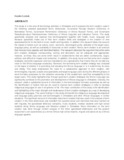Please use this identifier to cite or link to this item:
https://cris.library.msu.ac.zw//handle/11408/2848| Title: | Term creation : an analysis of the strategies used in some selected Shona specialised terms dictionaries | Authors: | Gumbo, Lettiah | Keywords: | Semantic expansion Phonologisation Dialectal variation |
Issue Date: | 2016 | Publisher: | University of South Africa | Abstract: | This study is in the area of terminology activities in Zimbabwe and it analyses the term creation used in the following selected specialised terms dictionaries: Duramazwi Reurapi Neutano (Dictionary of Biomedical Terms), Duramazwi Remimhanzi (Dictionary of Shona Musical Terms), and Duramazwi Redudziramutauro NeUvaranomwe (Dictionary of Shona Linguistic and Literature Terms). The study specifically analyses and explores how terminographers together with health, music, language and literature specialists made use of their term creation skills and strategies in the creation of new specialised terms for the field of music, health and linguistics. In addition, this research takes into account the impact of factors such as culture, socio- economic, etymological purity, attitudes of the target users, language policy, as well as availability of resources on term creation. Hence, term creation is an exercise that involves many aspects and interlinked factors. This research advances the argument that while some term creation strategies (compounding, coining and derivation) can be adequate and appropriate, however, at times; they are some which result in created terms that are rather cumbersome, vague, artificial, and difficult to master and remember. In addition, this study found out that some term creation strategies (semantic expansion and loan translations) are unproductive; that means they do not add any value on the Shona language vocabulary. Moreover, the borrowing term creation strategy was analysed on the basis of whether it is promoting and elevating the Shona language or is it undermining its value and vitality. This study emphasises the need for a collaborative approach to term creation, with terminologists, linguists, subject area specialists and target language users during the different phases of word formation processes for the collective ownership of the created term and their acceptability to the target users. This study highlights that, through good term creation strategies the Shona Language can significantly contribute to the promotion and development of Shona language in Zimbabwe. Overally, the research yields a substantial amount of information in the terminological formation processes as well as the identification of factors that can be used to improve term creation strategies in order to develop indigenous languages for use in all spheres of life. The major contribution of this study is the identification and highlighting of the major strength and weaknesses of term creation strategies as a way of developing indigenous languages. The useful findings in this study will benefit the indigenous language development and language policy planners and terminologists in Zimbabwe and other African languages in similar situations. The significant amount of information about term creation that was used in the analysis of term creation in the three dictionaries was solicited from questionnaires and interviews that were carried out with linguists, the specialised dictionary compilers, music students, medical students and high school students doing Shona language and literature subject in Zimbabwe. More information on the term creation was done through content analysis of the three specialised dictionaries and the present researcher’s own experiences as a former Shona high school teacher, linguist and above all as a Shona language speaker. | URI: | http://uir.unisa.ac.za/handle/10500/21015 http://hdl.handle.net/11408/2848 |
| Appears in Collections: | Theses |
Files in This Item:
| File | Description | Size | Format | |
|---|---|---|---|---|
| gumbo abstract.pdf | Abstract | 104.61 kB | Adobe PDF |  View/Open |
Page view(s)
130
checked on Apr 5, 2025
Download(s)
24
checked on Apr 5, 2025
Google ScholarTM
Check
Items in MSUIR are protected by copyright, with all rights reserved, unless otherwise indicated.



